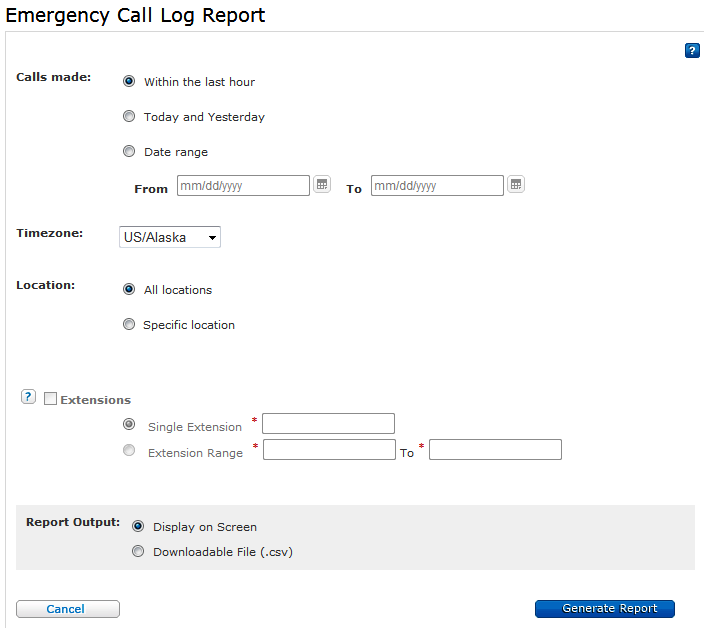AT&T Voice DNA® Administrator Support
Emergency Call Log Report
The Emergency Call Log Report provides details about emergency (911) calls made from your AT&T Voice DNA® service. You can view the results online or save them as a text file.
The report includes the following:
- Calling number
- Calling party’s name and provisioned service location
- Number called (911)
- Date
- Time (in the time zone you specify)
- Duration (seconds)
To run an Emergency Call Log report
- Open the AT&T Voice DNA Administrator Dashboard. (For help with logging in, see Log In.)
- At the top of the page, click REPORTS.
- On the Reports page that appears, under Service Usage, click Emergency Call Log Report. The Emergency Call Log Report page appears.
If your company is very large, you may see a My Recent Reports tab and an All Reports tab on the Reports page. To run a new report, click All Reports, and then click the report name. To view your pending and saved reports, click My Recent Reports. (For more information, see Manage Reports.)
Note: If you don’t specify any options, and just click Generate Report, you will get an onscreen display of all 911 calls made in the last hour.
- Specify the report’s time frame:
- For the most recent calls, select Within the last hour.
- For all calls within the last two days, select Today and Yesterday.
- For a range of days, select Date range and enter the dates in the format shown, or click the Calendar icons
 and select beginning and ending dates.
and select beginning and ending dates.
- From the Time Zone list, select the time zone in which you want the report times displayed. If your organization has more than one location, the default is UTC (Coordinated Universal Time, also called Greenwich Mean Time). If you have only one location, the default is the location’s time zone. You can select any time zone for your report.
- To select a specific location for the report, select Specific location, and then check the locations you want to include in the report.
- (Optional) If you selected specific locations, you can filter the report for specific phone extensions. Check Extensions, and then select Single Extension or Extension Range. Enter the appropriate extensions.
If you don’t check Extensions, the report will include information for all extensions at the selected locations. If you selected All locations, the report will automatically include all extensions.
- Under Report Output, select Display on screen or Downloadable file (.csv). (If you select Display on screen, you’ll get another chance to download the file later.)
Note: If your data set is too large, Display on screen may not be available. - Click Generate Report:
- If you selected Display on screen, the results appear on screen. To save the file, click Save results to a text file.
- If you selected Downloadable file (.csv), a report confirmation window opens. Click Download Report (CSV). In the File Download window that opens, click Open to view the results in your spreadsheet application, or click Save to save the results as a text file on your computer.
Note: For larger companies or data sets, the report may not run immediately. Instead, a confirmation message appears, telling you to check the My Recent Reports tab for the report. (For more information on using the My Recent Reports tab and managing reports for large companies, see Manage Reports.)
